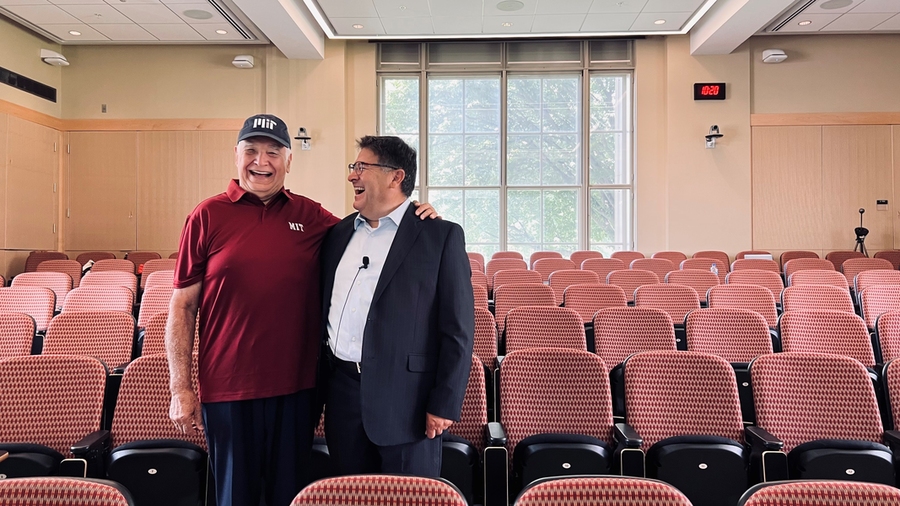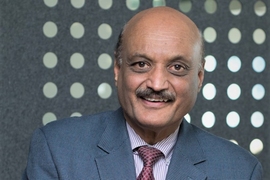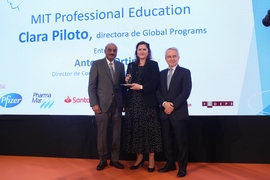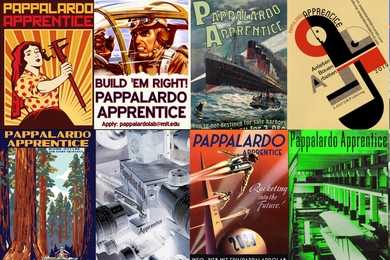After more than 50 years in tech leadership, you might think that Jesus Sotomayor would be content to rest on his laurels. But he’s not. An advocate of lifelong learning, Sotomayor was recently awarded MIT Professional Education’s Professional Certificate in Digital Transformation after successfully completing five Digital Plus courses online in Spanish.
Now he has his sights set on what’s next. “Thanks to the internet, I can keep learning by taking classes — virtually — at the best engineering school in the world: MIT,” says Sotomayor.
Redefining what it means to be nontraditional
There is hardly a “typical” learner at MIT Professional Education, but even so, Sotomayor stands out. After earning a doctorate in engineering, he founded a wireless networking company over two decades ago in his native Mexico, and serves on the boards of several firms that value his advice on the technology sector.
In a competitive environment, Sotomayor knows that state-of-the-art knowledge is a major differentiator. “I hate obsolescence, and the only way to stay up-to-date is to be close to academic research,” he explains.
Within a few minutes of meeting Sotomayor, one is reminded of Plato’s description of Socrates as the wisest man in the world because he knew how much he didn’t know. Over the years, Sotomayor has earned that same wisdom. “You need to be very humble, because if you're not humble you don't learn,” he says. Furthermore, he explains that when it comes to technology, it’s often young people who have more experience. He thinks that older people would do well to recognize this and accept that they have much to learn from younger colleagues.
Sotomayor has always held MIT in high esteem, but his admiration grew as he worked toward earning his Professional Certificate in Digital Transformation. “This program offered more than a traditional online approach,” says Sotomayor. “MIT's slogan is 'mens et manus,' which means they teach with a hands-on approach. All the professors have a tremendous theoretical basis, but they move immediately to practical lessons.” After learning about cloud services, for example, Sotomayor quickly began working with Amazon Web Services to develop applications.
Sotomayor also appreciated the sheer volume of useful insights he gained. Recalling former MIT President Jerome Wiesner’s statement that studying at MIT is like drinking from a fire hydrant, Sotomayor jokes, “Every time I see a fire hydrant on the street, I remember!”
“We talk a lot about the importance of being a lifelong learner if you want to succeed in today’s fast-changing business environment. But Jesus is living that. At 76 years old, his commitment to gaining new skills and perspectives is remarkable. It’s rewarding and inspiring to have the opportunity to share knowledge with someone with such a thirst for curiosity,” says David Niño, senior lecturer in the Daniel J. Riccio Graduate Program in Engineering Leadership and instructor for MIT Professional Education.
A fitting journey through format and language
MIT Professional Education's online courses gave Sotomayor the flexibility to access materials whenever he wanted, wherever he was in the world — and to review course material on demand. But even more enticing was the choice of five languages from which to take Digital Transformation courses, including English, Spanish, Portuguese, Italian, and French. Sotomayor chose to learn and engage with faculty and fellow professionals in his native tongue, Spanish.
“I was excited to use [Miguel de] Cervantes’ language for technical subjects,” says Sotomayor. “English is the best language for technology because Americans have invented so much, but when you mix Mexican culture with American culture, the result is the best of both worlds!”
He credits much of his academic success to his international peers who also participated virtually from around the world. “They were my professors as well. The quality of the program should not only be measured by the strength of the faculty, but by the other participants, who challenged and inspired me,” says Sotomayor. Today he continues to exchange ideas and advice with fellow participants from Chile and Europe.
Coming full circle: Learning, sharing, and giving back
Sotomayor put his new knowledge to work immediately. His coursework with Bhaskar Pant, executive director of MIT Professional Education and instructor of Cultural Awareness for Global Business, helped him better understand cross-cultural relationships in his international business dealings. Learning about various cloud computing platforms inspired him to dream big, freed from the limitation of maintaining physical data centers. He can envision how new technologies like blockchain ledgers could transform developing economies like Mexico’s, where 50 percent of financial transactions are informal.
“Jesus not only demonstrates the value of lifelong learning, but actively espouses MIT's motto of ‘mind and hand’ in acquiring new knowledge. He’s learning about disruptive technologies and actively applying his skills in the real world across geographies. It is such a pleasure to have Jesus as one of our role model students; he helps promote innovation in places where people want it and need it most; where it can drive growth and impact communities for the better,” says Pant.
Sotomayor also has personal reasons to continue his education. “I wanted to earn that MIT certificate to show it to my grandsons. I want to leave them the legacy that their grandpa, at 76 years old, is still studying,” explains Sotomayor. “And I want to leave this message for my family, for my employees and colleagues, for my partners and for my students: In matters of education, there is no point of saturation.”









